|

photo - mw
_______________________
Armchair woodsmen
I have books on chopping wood, baking bread and butchery. But what do I really know if I never set foot in the forest?
Michael Gibb
(....)Most of what I know about firewood comes from a Norwegian book entitled Hel Ved (2011), which roughly translates as ‘solid wood’. It was written by the novelist Lars Mytting and contains detailed discussions of every aspect of sourcing, chopping, drying, storing and burning wood. There are tables in the back listing the drying rates and percentage of ash you can expect from different species of tree. There are references to research conducted by something called the Norwegian Institute of Wood Technology. Mytting is serious about his firewood.
(....)
There are some individuals for whom such a reference library makes undoubted practical sense. If you live in an extremely rural community, some mastery of this knowledge is likely essential both for comfort and survival. I, on the other hand, live in central London. The two pigeons nesting in our chimney suggest that it is a long time since the disabled fireplace in our converted Victorian terrace last saw any action, and the local council would put an end to any aspirations I might have for a wood-burning oven in what can only with considerable generosity be called our back garden. There is, in short, perhaps some absurdity in my taste for survivalist literature. And yet I am not alone. I belong to a growing community of woodsmen, butchers and craftsmen of various kinds who ply their trade from the armchair....(more)
Aeon Magazine
_______________________

Iron Bridges at Asničres
Émile Bernard
1868–1941
_______________________
Stan Allen interview
by Nader Tehrani
Bomb
Stan Allen has been an active and vocal force in architecture over the past 25 years. As the former dean of the School of Architecture at Princeton, the principal of Stan Allen Architect, and the author of numerous books and articles (among them the essay “From Object to Field: Field Conditions in Architecture and Urbanism,” to which we refer repeatedly in this conversation), his impact has been felt from the realms of practice to the academic world. In the “Field Conditions” text, he articulates new ways in which “difference” can be accommodated in compositional strategies that do not resort to figural, typological, or iconic variations and he unearths a series of aggregative strategies that demonstrate the wide range of spatial, formal, and material possibilities immanent in the systemic logics of the field itself. Protean in many ways, Allen’s mission has been to define some of the irreducible aspects of the architectural discipline on the one hand, while on the other he has used his experience with the arts—painting, film, sculpture, and beyond—to expand the intellectual terrain on which architects walk....(more)
BOMB 123/Spring 2013
_______________________
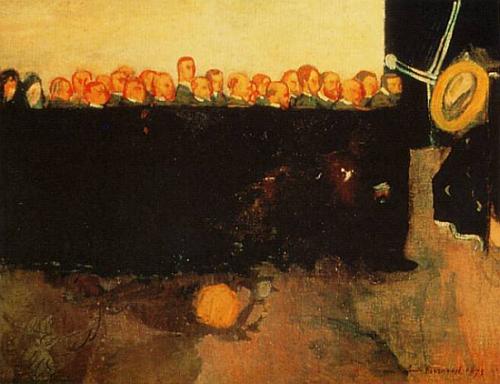
Vincent Van Gogh's Funeral
Émile Bernard
1893
_______________________
Social Control in Mental Health
Jeremy
An und für sich
(....)
... Deviance from accepted norms of behavior is a sign of sickness that must be addressed through increasingly intensive and onerous treatments. As my colleague frequently critiques on this blog, health is understood as having a job, a nice haircut, a spouse, and a capacity to sit quietly on the subway. To a distressing degree, illness is essentially understood as anything non-normative. Screaming at pigeons in the park? I can construct a rationale to understand that as a symptom of illness. But an eight-year-old boy staring out a window in school has a disease? Surely there have been people whose lives have been destroyed by ADHD. However, slowly but surely, idiosyncratic elements of the individual are re-labeled as beyond the pale and thus necessitating treatment and psychological intervention.
(....)
As a mental health provider, I strenuously resist this implied position of equating norms with health. I think it is imperative that we collectively maintain the position that we do not, in fact, know what is best for other people in most situations, and that we do violence to their freedom and integrity as individuals, and therefore ourselves, by imposing the will of the third/big other. Towards this end, I am frequently reminded of something once said by the prominent psychoanalyst Otto Will: “As I see it, my task is to help this person look at, and evaluate, his life and his prospects. I don’t know how he should live, but I may be able to help in discovering this for himself. I am not an expert at living.”
...(more)
_______________________

photo - mw
_______________________
The Force That Drives the Flower
Annie Dillard
b. April 30, 1945
The Atlantic Monthly | November 1973
(....)
I don't know what it is about fecundity that so appalls. I suppose it is the teeming evidence that birth and growth, which we value, are ubiquitous and blind, that life itself is so astonishingly cheap, that nature is as careless as it is bountiful, and that with extravagance goes a crushing waste that will one day include our own cheap lives. Every glistening egg is a memento mori.
Now, in late June in the Blue Ridge, things are popping outside. Creatures extrude or vent eggs; larvae fatten, split their shells, and eat them; spores dissolve or explode; root hairs multiply, corn puffs on the stalk, grass yields seed, shoots erupt from the earth turgid and sheathed; wet muskrats, rabbits, and squirrels slide into the sunlight, mewling and blind; and everywhere watery cells divide and swell, swell and divide. I can like it and call it birth and regeneration, or I can play the devil's advocate and call it rank fecundity—and say that it's hell that's a-poppin'.
This is what I plan to do. Partly as a result of my terrible dream, I have been thinking that the landscape of the intricate world that I have cherished is inaccurate and lopsided. It's too optimistic. For the notion of the infinite variety of detail and the multiplicity of forms is a pleasing one; in complexity are the fringes of beauty, and in variety are generosity and exuberance. But all this leaves something vital out of the picture. It is not one monarch butterfly I see, but a thousand. I myself am not one, but legion. And we are all going to die.
In this repetition of individuals is a mindless stutter, an imbecilic fixedness that must be taken into account. The driving force behind all this fecundity is a terrible pressure I also must consider, the pressure of birth and growth, the pressure that squeezes out the egg and bursts the pupa, that hungers and lusts and drives the creature relentlessly toward its own death. Fecundity, then, is what I have been thinking about, fecundity and the pressure of growth. Fecundity is an ugly word for an ugly subject. It is ugly, at least, in the eggy animal world. I don't think it is for plants.
...(more)
_______________________
The page, the page, that eternal blankness, the blankness of eternity which you cover slowly, affirming time's scrawl as a right and your daring as necessity; the page, which you cover woodenly, ruining it, but asserting your freedom and power to act, acknowledging that you ruin everything you touch but touching it nevertheless, because acting is better than being here in mere opacity; the page, which you cover slowly with the crabbed thread of your gut; the page in the purity of its possibilities; the page of your death, against which you pit such flawed excellences as you can muster with all your life's strength: that page will teach you to write.
—
Annie Dillard, The Writing Life

Boy Destroying Piano
Phillip Jones Griffiths
Iconic Photos
Famous, Infamous and Iconic Photos
Philip Jones Griffiths
1936 - 2008
_______________________
Fear as a Constant Companion
Within the National (In)Security State
Phil Rockstroh
Anxiety is the dizziness of freedom.
Søren Kierkegaard
Life, as lived, moment to moment, in the corporate/consumer state, involves moving between states of tedium, stress, and swoons of mass media and consumer distraction. Therein, one spends a large portion of one’s economically beleaguered life attempting to make ends meet and not go mad from the pressure and the boredom. Where does a nebulous concept such as freedom even enter the picture, except to be a harbinger of an unfocused sense of unease, that all too many look to authority to banish?
Finding a balance between anxiety and freedom is not something that comes easy to us.
In a society beset with a lack of purpose and meaning, patriotism, empty self-promotion and jingoism are mistaken for strength and character, when, in fact, they are anathema. Weakness compensates by affecting a cretinous swagger. Those who lack a centering core crave power. Beneath it all, quakes one who fears risking intimacy…is terror stricken by the vulnerability attendant to risking love. Those who fear the uncertainty inherent to intimacy and freedom perceive a world fraught with ubiquitous danger.
They terrorize themselves; therefore, they see terrorists everywhere.
(....)
Under the tedium, angst, and ennui of corporate state rule, people get high on the adrenal rush induced by the mass media feedback loop. Also, there is the illusion of breaking the spell of alienation and becoming part of a larger order.
It is troubling that the adrenaline-tweaked, news-as-mass-spectacle audience/primed-for-authoritarianism citizenry of the U.S. seems indifferent to, or oblivious of, the following: The test of a free society comes when that society is put under duress e.g., not allowing the power-besotted, authoritarian freaks in charge to use the acts of a few violent, lost souls as a means to curtail freedom and consolidate unaccountable power for themselves.
...(more)
_______________________
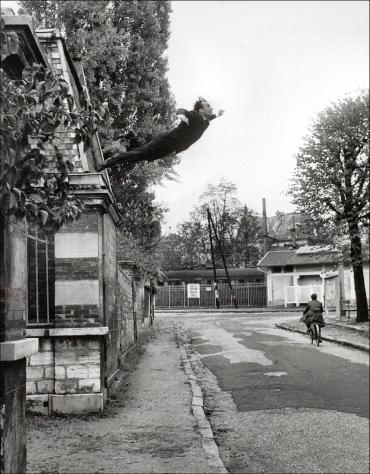
"Leap into the void"
1960
Yves Klein
b. April 28, 1928
_______________________
Spring is like a perhaps hand
(which comes carefully
out of Nowhere)arranging
a window,into which people look(while
people stare
arranging and changing placing
carefully there a strange
thing and a known thing here)and
changing everything carefully
spring is like a perhaps
Hand in a window
(carefully to
and fro moving New and
Old things,while
people stare carefully
moving a perhaps
fraction of flower here placing
an inch of air there)and
without breaking anything.
- e.e. cummings
_______________________

photo - mw
_______________________
Dirt
John Latta
(....)
And as the plant grows older it realizes it will never be a tree,
Will probably always be haunted by a bee
And cultivates stupid impressions
So as not to become part of the dirt. The dirt
Is mounting like a sea. And we say goodbye
Shaking hands in front of the crashing of the waves
That give our words lonesomeness, and make these flabby hands seem ours- . . .
—
John Ashbery, out of "'How Much Longer Will I Be Able to Inhabit
the Divine Sepulcher . . .'" (The Tennis Court Oath, 1962)
(....)
The vetch has turned purple. But where is the bride?
It is easy to say to those bidden-But where,
Where, butcher, seducer, bloodman, reveller,
Where is sun and music and highest heaven's lust,
For which more than any words cries deeplier?
This mangled, smutted semi-world hacked out
Of dirt. . . It is not possible for the moon
To blot this with its dove-winged blendings.
—
Wallace Stevens, out of "Ghosts as Cocoons"
...(more)
_______________________
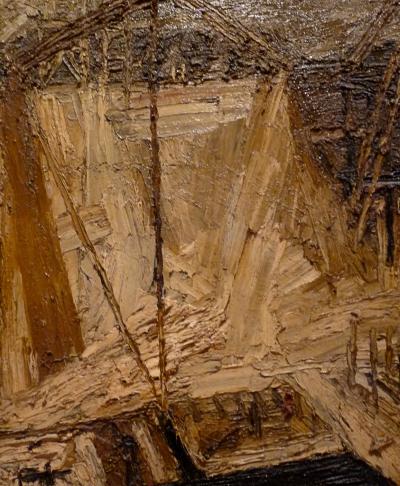
London building site
Frank Auerbach
b. April 29, 1931
_______________________
Eternity No More: Walter Benjamin on the Eternal Return
Tyrus Miller
in Given World and Time: Temporalities in Context, edited by Tyrus Miller
"Men of the nineteenth century, the hour of our apparitions is fixed forever, and always brings us back to the very same ones."
— Blanqui, 1872
On January 6, 1938, Walter Benjamin wrote to Max Horkheimer from San Remo to report on a remarkable development in his thinking about his Baudelaire studies and about the larger framework of the Passagenwerk, Benjamin's decade-long historical research about 19th-century Paris, a project that he described as an "Urgeschichte der Moderne" (an archaic history of modernity). The occasion of this development was his encounter with a largely forgotten text by the famous insurrectionist Auguste Blanqui, entitled L'éternité par les astres (Eternity According to the Stars). This short book comprised a set of cosmological speculations written in prison by the old revolutionary near the end of his life, and coupled arguments from the popular science of Blanqui's day with a remarkable vision of infinite repetitions of the same in an indefinite series of parallel worlds. Here is Benjamin's report to Horkheimer:
In the last weeks I have made a strange find that will decisively influence the work: I came upon the text, Blanqui's last, which he wrote in his final prison,in the fortress of Taureau. It is a cosmological speculation. . . .and is, as far as I can tell, till now as good as unknown. . . . Admittedly,at first glance the text is tasteless and banal. Whereas what constitutes its main portion are the clumsy meditations of an autodidact, these prepare for a speculation about the universe that could be provided by no one lesser than this revolutionary. If Hell is a theological object, one could call these speculations infernal. The world view that Blanqui sketches here, while taking its data from the mechanistic natural sciences of his day, is in fact infernal--but is at the same time, in the shape of something natural, the complement of the social order that Blanqui must have recognized in the evening of his life to be the victor. What is astonishing is that this sketch is completely without irony. It represents an unconditional surrender,but at the same time the most terrible lament against a society that projects this images of the cosmos against the sky. The piece has as its theme, the eternal recurrence, the most remarkable relation to Nietzsche; and a more hidden and deeper one to Baudelaire, with whom in a few of its magnificent points it resonates almost word-for-word.
Although this was only two years from the close of Benjamin's own defeated life, this seemingly minor discovery of a truly marginal text of Blanqui crystallized a whole new set of motives in the Passagenwerk studies and seemed to offer Benjamin a conceptual hinge for the juncture of modernity and myth he intuited in the culture of 19th-century Paris. In fact, in the final, 1939 version of his exposé of the Passagenwerk he granted the last word--in his text and about the nineteenth century--to the messengers of the eternal recurrence. In his final paragraph, following a quote from Blanqui's L'eternité par les astres, Benjamin concludes:
The century was incapable of responding to the new technological possibilities with a new social order. That is why the last word was left to the errant negotiators between old and new who are at the heart of these phantasmagorias. The world dominated by its phantasmagorias--this, to make use of Baudelaire's term, is "modernity." Blanqui's vision has the entire universe entering the modernity of which Baudelaire's seven old men are the heralds. In the end, Blanqui views novelty as an attribute of all that is under sentence of damnation. Likewise in Ciel et enfer, a vaudeville piece that slightly predates the book: in this piece the torments of hell figure as the latest novelty of all time, as "pains eternal and always new." The people of the nineteenth century, whom Blanqui addresses as if they were apparitions, are natives of this region.
...(more)
X Poetics
For Sound, Crossing, Mobility, Exchange, For Doubt & Uncertainty, Bird Cries, Duende, Multiplicity, Former, Excess, Xcountry
_______________________

The Awning
Frank Auerbach III 2008, 2008
_______________________
Mud Is Mud: Ongoing Notes Toward An Essay On The Art Of Fiction
Sina Queyras
lemon hound
Clarity is not accessibility.
Accessibility is not simplistic.
Brevity isn’t minimalism.
Oblique is often too much distance.
Less is not always more.
Excess is not experimental.
...(more)

photo - mw
_______________________
Doina Ioanid
Translated from the Romanian by Florin Bican
Translator's note: Doina Ioanid or the epiphany of melancholy
exquisite corpse
(....)
Too tired, too myopic. Even my name, a squashed clam, slowly sinks through my skin deep within me, past soft tissues, past organs pulsating like terrified suns, deep down to where none of the things on the outside can force their way in any more.
(....)
It may well be I’m no different than the seagulls along the embankment--a whitewashed crow, just like Mika-Lé used to say. Hey, you can’t possibly think they are seagulls for real... What on earth should them seagulls be doing in the middle of Bucharest?, Mika-Lé taunted me through her razor-sharp lips. I could hear, all the same, their ravenous cries and could see their lot prowling, along with needy fishermen, for the same paltry prey soiled past redemption with infested waters. I could see them rummaging through the garbage along with the homeless. And in my turn I started asking myself what on earth was I doing on the embankment, what was I doing in that raving mad city? The earthworms after the rain were wriggling their way to my feet. Slowly but surely. And all I could do was just stand there, all on my own, like some potted plant, roots gone all mouldy.
...(more)
.....................................................
(....)
Her prose poems are just as many epiphanies, trimming poetic perception – and expression – of all excess baggage. Yet stark they are not. They are, rather, streamlined vehicles (deep-sea vessels spring to mind), and very sophisticated ones at that, meant to take the reader beyond usually unquestioned borders, into an abyss both familiar and scary. While exploring herself, Doina Ioanid seems to trigger off in the reader an irrepressible urge to replicate the process with his/her own personal data. Never was intimacy more discreet – or more universal, for that matter. And that’s what makes Doina Ioanid’s poetry so substantial: the constant yet delicate delving into a multilayered, multifaceted reality in a redemptive attempt to make sense of things without robbing them of their aura.
—
Florin Bican
_______________________

Small Boats
Shoreline of Mississippi River
1910 ca.
The Cassville Photographs of Frank W. Feiker
Wisconsin Historical Images
_______________________
Wittgenstein's Dream
Peter Porter
I had taken my boat out on the fiord,
I get so dreadfully morose at five,
I went in and put Nature on my hatstand
And considered the Sinking of the Eveninglands
And laughed at what translation may contrive
And worked at mathematics and was bored.
There was fire above, the sun in its descent,
There were letters there whose words seemed scarcely cooked,
There was speech and decency and utter terror,
In twice four hundred pages just one error
In everything I ever wrote—I looked
In meaning for whatever wasn't meant.
Some amateur was killing Schubert dead,
Some of the pains the English force on me,
Somewhere with cow-bells Austria exists,
But then I saw the gods pin up their lists
But was not on them—we live stupidly
But are redeemed by what cannot be said.
...(more)

Ludwig Wittgenstein
b. April 26, 1889
rowing from Skjolden to his house
_______________________
Sentenced to Depth
an interview with William H. Gass
interviewed by John Madera
(....)
JM: So, how about the title, Middle C? Besides the musical reference, what else does it suggest to you? And in the excerpt “The Music Lesson” there’s a whole conversation between Joseph and his teacher Mr. Hirk about middle C on the piano.
WHG: It’s a grade in class. It’s mediocrity. The stuff I put about middle C in the mouth of the teacher, so-called, was gleaned, of course, from standard things said about it in the history, and it stands, really, for the whole traditional association of emotions, feelings, attitudes, etc., with various keys and various chords, and so forth, which grew out of, flourished finally, in the nineteenth century.
It is all about being nobody. It’s all about being however foundational, or thought to be foundational. The character is busy escaping the contamination of other human beings as his father apparently was doing. As [Thomas] Hobbes suggested, when you have an absolute sovereign, you have no rights, and you can be snuffed out; and the only way to avoid that is to be unobservable, to be so quiet, to be so out of it. This character tries to imitate that while nevertheless trying to make do with the situation he finds himself in, being hauled out of Austria ahead of the Nazis. He has to make a living and so forth. His living depends on his life being made up. He’s a fraud. So he sends a fraudulent self to work in the world. It can get as soiled as it likes, but another self will be back behind, not touched by . . . This is an idiotic view in a way, but my main theme is questioning what is the ordinary citizen’s responsibility for what goes on in the world. I don’t have an answer to that question exactly. [Laughter]
(....)
Rain Taxi Online Edition: Spring 2013
_______________________
The Motive for Metaphor
Denis Donoghue
(....)
... Stevens was not a trained philosopher, but his desires were philosophic. Mostly, he hoped-against-hope that Idealism would turn out to be true—that consciousness would be found to account for the whole of one’s experience.
But he felt misgiving about planning to see anything “at the exactest point at which it is itself.” That way, Naturalism lies— fixity, and specious certitude. For the time being, in “The Motive for Metaphor,” he can only cry out against the dominant X. He was not alone in that protest. Ortega y Gasset maintained that the chief motive of art since Baudelaire, Mallarmé, and Debussy has been to reject the conventional privilege ascribed to external things, objects, and faces, and to cultivate entirely formal, aesthetic inventions. I assume he had modern abstract or non-figurative paintings in view and knew that these had their own authority, however occult. That is why Stevens was pleased to find Charles Mauron saying, in his Aesthetics and Psychology (1935), that “the artist transforms us, willy-nilly, into epicures.” He was also pleased to find, in Simone Weil’s La Pesanteur et la grāce, a chapter on “decreation.” Stevens commented:
She says that decreation is making [something] pass from the created to the uncreated, but that destruction is making [something] pass from the created to nothingness. Modern reality is a reality of decreation . . .
I think he was pleased, too, to find Picasso saying that a picture is a horde of destructions, if only because it allowed Stevens to say that “a poem is a horde of destructions.” Metaphor, according to Ortega, has been the main device in an artist’s rejection of external things. “Metaphor alone furnishes an escape.” Its efficacy verges on magic. Between real things, it “lets emerge imaginary reefs, a crop of floating islands.” Metaphor “disposes of an object by having it masquerade as something else.” We ascribe to Nietzsche but not only to him the desire to be elsewhere, which is a variant of the desire to be different. In certain moods the horror of a word is the meaning it defends against all comers; so metaphor is the device by which one undermines that defense. In Stevens’ “Someone Puts a Pineapple Together,” the someone contemplates “A wholly artificial nature, in which / The profusion of metaphor has been increased.” If you put a pineapple together and see metaphors becoming more profuse, you release yourself from psychological determinations, you become a performative gesture and are happy to find yourself in that state. But then a scruple may assert itself:
He must say nothing of the fruit that is
Not true, nor think it, less. He must defy
The metaphor that murders metaphor.
Presumably a bad metaphor murders a good one: bad in the sense of telling lies, ignoring the truths that can’t honorably be ignored....(more)
_______________________
The Motive for Metaphor
Wallace Stevens
You like it under the trees in autumn,
Because everything is half dead.
The wind moves like a cripple among the leaves
And repeats words without meaning.
In the same way, you were happy in spring,
With the half colors of quarter-things,
The slightly brighter sky, the melting clouds,
The single bird, the obscure moon--
The obscure moon lighting an obscure world
Of things that would never be quite expressed,
Where you yourself were not quite yourself,
And did not want nor have to be,
Desiring the exhilarations of changes:
The motive for metaphor, shrinking from
The weight of primary noon,
The A B C of being,
The ruddy temper, the hammer
Of red and blue, the hard sound--
Steel against intimation--the sharp flash,
The vital, arrogant, fatal, dominant X.
.....................................................
Northrup Frye on The Motive for Metaphor
The Educated Imagination
_______________________

Frank Feiker
_______________________
Texts In Sebald’s The Rings Of Saturn
The Public Domain Review
(....)
Among the many lives of the past encountered is a myriad array of literary figures. Collected together in this post are the major texts of which, and through which, Sebald speaks – accompanied by extracts in which the texts are mentioned. The list begins and ends with the great polymath Thomas Browne, an appropriate framing as the work of this 17th century Norfolk native has a presence which permeates the whole book. Indeed, in the way he effortlessly moves through different histories and voices, it is perhaps in Browne’s concept of the ‘Eternal Present’ which Sebald can be seen to operate, in this mysterious community of the living and the dead.
...(more)
_______________________
"Because none of us are as cruel as all of us":
Anonymity and Subjectivation
Liam Mitchell
ctheory
_______________________

photo - mw
_______________________
There are no lone inventors
Matt Novak
(....)
The truth is that history, like innovation, is messy. What starts as an idea for a product, or a service, or an institution is dependent upon thousands of forces seen and unseen, recognized and unrecognized, historical and contemporary. In reality, the Internet was invented by thousands of people. To buy into the other version of history means you buy into the “myth of the lone inventor”—an idea that creates simple, even entertaining narratives, but which does a great disservice to the thousands of people who have invented our modern world.
Nowhere is the perpetuation of this myth greater than in the work of the late Serbian-American inventor Nikola Tesla—the man, we are often told, who invented everything from radar to radio and domestic electricity supplies. The fanaticism surrounding Nikola Tesla has reached fever pitch in recent months, driven by new films, endless blog posts and a high-profile effort to fund a museum dedicated to the legendary inventor. But the byproduct of this effort to reposition Tesla in the scientific canon has been the creation of many more myths about the man—myths that actually harm our understanding of history and the history of innovation.
...(more)
_______________________
Cost Per Impression: Anti-history of The Persuaders
Erik Stinson
(....)
Advertising doesn’t have a history, because it doesn’t want one. Advertising, the gaping, whoring mouth of the capitalist beast, would prefer to exist totally in the present, without past or future. Like the ideal customer. Pleasure button. Flashing tits. Chemical burrito under Kino Flo studio lights. The director screams at the food stylist one last time, then jogs to the talent trailer for nap.
What advertising wants is a handjob and another ten million minds to feed with plastic desire. Why read? Why think?
What I want is a little context, a little background. I’d like to put together my own working understanding. It probably won’t happen....(more)

Kindje met bloemen
1947
Karel Appel
b. April 25, 1921
_______________________
The Castaway Is Washed Ashore
Peter Porter
(16 February 1929 - 23 April 2010)
(....)
Mixed metaphors sail on apace,
The ship goes down and then
A second time the splintered face,
A Castaway again –
A pair of ragged claws might row
Me safely from the undertow.
Quotations like a flag unfurled
In cruel convenience
Showed my position in the world,
The past my present tense.
As mushrooms, rose the childish faces,
A succulence of desert places.
...(more)
Peter Porter at the Australian Poetry Library, the Poetry Foundation and Poetry International_______________________
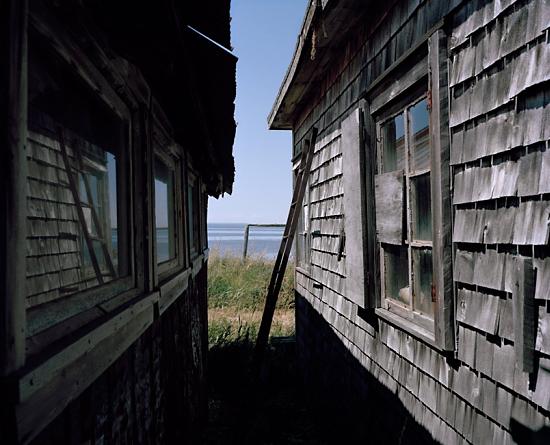
Salines, Petit Méchin
Aprés Strand
Bertrand Carričre
The gallery is pleased to announce our sixth exhibition of work by Bertrand Carričre. "Aprčs Strand" revisits a part of photographic history through the work of American photographer Paul Strand and his connection to Carričre's own territory, Québec.
During the summer of 2010, Carričre travelled to the Gaspé Peninsula, following the route that Strand took in 1929 and 1936. From his two trips to Gaspésie, Strand produced a number of pictures, but few are known to the general public.
Carričre's photographs adopt Strand's vision of photography and his approach to landscape. While deliberately avoiding imitation, he allowed himself to absorb Strand's lessons, observing time, memory and landscape. Carričre is fascinated with stories that are bound to the land, traces of which persist to this day. His attention was drawn to the social landscape and vernacular architecture, documenting modest houses, barns, fishermen's cabins and wayside crosses. He photographed some of the inhabitants he met, trying to be faithful to a humanistic approach, out of respect for the people who have shaped the land and have kept these remote communities alive, while struggling with an unforgiving climate and difficult socioeconomic conditions.
The Gaspésie that Strand documented no longer exists, but Carričre's work was deeply inspired by the places Strand photographed.
— bulger gallery
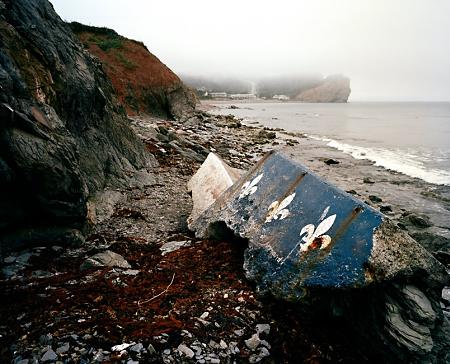
Plage, Percé
Aprés Strand
Bertrand Carričre
via Joerg Colberg
_______________________
Archetypes of Dissent
Mapping the cultural contraflow of revolt.
Andy Merrifield
(....)
What we have here is an expressive politics that “appears” in a different guise, in its true guise of invisibility, simultaneously present and absent in “public” space.
In fact, the whole idea of opacity and dissimulation, of clandestinity and anonymity is part and parcel of an archetype of contemporary militant politics, part of its tactic and identity, part of the armory of what dissent is and should be. Perhaps it’s possible to draw up a list of “archetypes of dissent,” of progressive, not reactionary dissenters. Archetypes that symbolize, as Jung would have had it, an innate disposition to make trouble, to protest, to revolt against the structures of modern power; to let power know that ordinary people are still alive and kicking, and that staying alive necessitates every once in a while kicking out at power, at its structures of law and order.
...(more)
_______________________

Vragende kinderen
Questioning Children
Karel Appel
1949
_______________________
Of Mini-Ships and Archives
Daphne Marlatt
lemon hound
... from a broader perspective, language itself is a living archive. More specifically, the history of a language is an archive of the cultural changes and linguistic borrowings of its speakers through centuries of usage. As a poet, I recognize this fact from hours at my desk behind a closed door (the gift of not just solitary but uninterrupted time) where I trace glimmers of half-erased, half-perceived connections between words and their historic trade routes through time. Nouns, little ships freighted with meaning, fossilized verbs that once sailed their way through seas of speech, language to language. My tracing of these routes will find their way (or not) into sentences composing a larger verbal structure that may (or may not) eventually find its way into print. Often these mini-ships, hand jottings on draft pages of print or nearly illegible scribbles on scraps of paper, get lost in file folders in drawers or boxes, eventually to land, years later, on a library shelf under bright lights in what is termed an archive. Docked, documented. Archivally (re)constructed.
Reconstruction: putting together scattered fragments, putting together what once occurred or was experienced as a gestalt, a whole, but is now available only in shards, odd notes on variously sourced, undated pages or bits of paper. To some degree, the drive behind collecting a writer’s archive is rather like what drives archaeology. It is similar to resurrecting the dead, if such a thing were possible. But then there is also what is lost in the living, layers and layers of memory that are now simply recalled by outline, by the repeated telling of an event that the body’s complex sensoria once experienced fully in all the emotional and mental reverberations of a moment’s impact. Perhaps this desire is the drive behind oral history and its effort to uncover and make public what people have experienced as personal. It is the memories of individual lives that together make up the particular history of a community—another kind of archive—recorded and made public as the unofficial history of the legislated-upon, rather than the official history of the legislators. These memories, often considered too personal to be of public value, when collected and published compose alternative or alternate views of official history, views that deepen our understanding of the impact of past events. So I discovered in 1972, when I first began working on a team collecting the Japanese Canadian oral history of Steveston, which at that point was largely untold outside of the community.
...(more)
from Basements and Attics, Closets and Cyberspace: Explorations in Canadian Women’s Archives (edited by Linda M. Morra and Jessica Schagerl) Wilfrid Laurier University Press Introduction: No Archive is Neutral
_______________________
from Unusual Woods
Gene Tanta
(....)
(turn) in the fast darkness of ancient forests,
shadows cross our dreaming faces (turn)
in the movies, an oak tree is always more there
after it’s gone (turn)
this way, a saw emphasizes one thing (turn)
formalwear, night fog rolling in
dressing the silver-blown accessories
(turn) in the morning,
when the rain goes to work,
the cemetery trees shade the cemetery dead
and spiders (turn) play the harps of corners
when the wind sighs, weathercocks turn
to look for a reason (turn)
...(more)
Almost Island
Unusual Woods
Gene Tanta BlazeVOX
Gene Tanta
poet, artist, teacher
_______________________
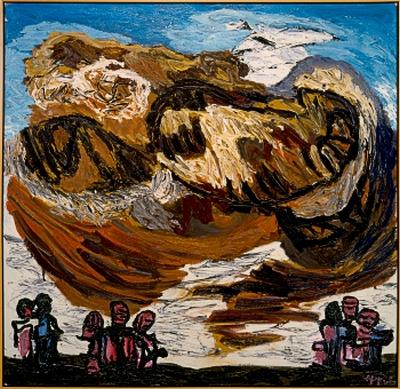
Clouds and People
Karel Appel
1984
_______________________
Sleeping with the Alphabet
Peter Porter
You glorious twenty-six, not equal
In purport, short straws of words,
Come with me in the night-time squall,
My hurricane of verbs.
My chiefest pegs to hang fear on —
Don’t think it’s only sights
Which dreams call up — Wordsong
Lingers in the tucks and sweats.
Sounds of pre-performance, cries
Subsumed in nothingness,
Hoping to syllabicize
Themselves as messages?
The A of Anger, E of Death,
An I who might not be myself
And O the deadly wind that bloweth
Unto U, my vowel of Truth
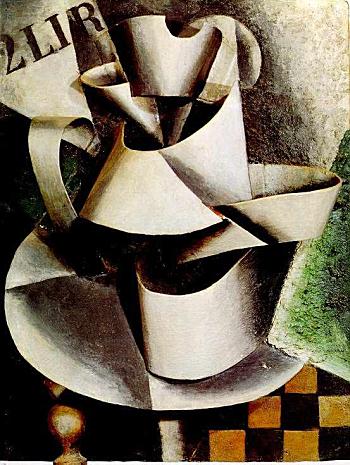
Jug on table
1915
Liubov Popova
April 24, 1889 – May 25, 1924
_______________________
The Mythical Liberal Order
Naazneen Barma, Ely Ratner, Steven Weber
(....)
Where exactly is the liberal world order that so many Western observers talk about? Today we have an international political landscape that is neither orderly nor liberal.
(....)
The liberal order can’t be under siege in any meaningful way (or prepped to integrate rising powers) because it never attained the breadth or depth required to elicit that kind of agenda. The liberal order is today still largely an aspiration, not a description of how states actually behave or how global governance actually works. The rise of a configuration of states that six years ago we called a “World Without the West” is not so much challenging a prevailing order as it is exposing the inherent frailty of the existing framework.
This might sound like bad news for American foreign policy and even worse news for the pursuit of global liberalism, but it doesn’t have to be so. Advancing a normative liberal agenda in the twenty-first century is possible but will require a new approach. Once strategists acknowledge that the liberal order is more or less a myth, they can let go of the anxious notion that some countries are attacking or challenging it, and the United States can be liberated from the burden of a supposed obligation to defend it. We can instead focus on the necessary task of building a liberal order from the ground up....(more)
_______________________

Orestes
Willem de Kooning
1947
_______________________
Real Faces of the Minimum Wage
Richard Eskow
Corporate interests and their elected representatives have created a world of illusion in order to resist paying a decent wage to working Americans. They’d have us believe that minimum-wage workers are teens from ’50s TV sitcoms working down at the local malt shoppe.
It’s a retro-fantasy where corporate stinginess creates minority jobs, working parents can’t possibly be impoverished, and nobody gets hurt except kids who drive dad’s convertible and top up their allowances with a minimum-wage job slinging burgers.
But then, you probably need to resort to fantasy arguments when you’re arguing against a minimum-wage increase supported by nearly three-quarters of the voting public. That’s also why it’s important to demand that Congress allow an up-or-down vote on the Fair Minimum Wage Act, which would raise it to $10.10 and then index it to inflation.
Here’s the truth: Most minimum-wage workers are adults, the majority of them are women, and many are parents who are trying to raise their children on poverty wages....(more)
_______________________
Defining the precariat
A class in the making
Guy Standing
Class has not disappeared. Instead, a more fragmented global class structure has emerged alongside a more flexible open labour market. This prompts Guy Standing to forge a new vocabulary capable of describing class relations in the global market system of the twenty-first century.
_______________________
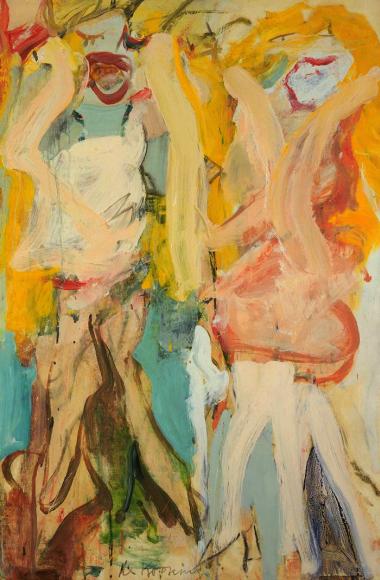
Women Singing II
1966
Willem de Kooning
(April 24, 1904 – March 19, 1997)
_______________________
Essays in response
Nude Literary Review
Issue I: February 15, 2012
Modernism, Again
Peter Carne
Many of the responses to Lars Iyer's ‘Manifesto' that have appeared, mostly online, in the weeks since its publication have concentrated on how the ‘death of literature' is nothing new, that this call has been made on many past occasions and its passing will continue to be announced in the future. This is all true, but what I think has been missing from the discussions is a focus on the positive side of Iyer's argument: the second half of the piece – that proposes, and offers examples of, the types of fiction that one can ‘write at the wake' – seems to have been neglected in favour of the comment-generating provocativeness of the first.
(....)
Few people are, I imagine, shrinking from the works of Bolańo and Bernhard in horror. Yet, they do seem to be highlighting something that many critics and readers want to avoid a discussion of: literature’s end. However, this is only an end like all the other ends. I perceive the plea for more modernism in Iyer’s piece to be present in his calls for writers to be practicing their craft as though ‘at a wake’, recommending that they use an ‘unliterary plainness’ that ‘knows the game is up’, including the ‘gloomy, farcical life’, and writing about ‘this world … the world of dead dreams.’ Through the hyperbole one only expects to be found in manifestos (thus giving Iyer the means to make use of such sweeping and provocative sentences), the reader is witness to the appeal for writers – if they just can’t give up the game entirely – to embrace the end and build a style around that finality, using the recommendations listed above. But, as Iyer points out in his paean to Bernhard, the style of writing that he expounds is one that originates from within the very rejection of the literary (things we may associate with ‘masterpieces’ and being part of what ‘great’ literature does): a great literary work today would therefore have to be unliterary – if you could excuse the contradiction – because it would represent, with honesty, the artistic deadlock we’re in. ‘Of course, the irony of Bernhard is that while his narrators fail again and again even to begin, Bernhard himself has found a form and a way to speak.’ It is on the back of this example that Iyer can contend that, ‘only at the very edge of the abyss can we remember what is untouchable.’ For me, the product of Iyer’s demands would be work that, following Josipovici, is modernist – even if we avoid describing it as that – through and through.
(....)
By contending that Iyer’s manifesto calls for more modernism I don’t just have Josipovici in mind. In fact, we can look to philosophy and critical theory for what I believe to be the most important insights into the ‘inward turn’ – and the other factors that could be thought of as the starting points for modernism – mentioned above. In the work of the American academic Eric L. Santner we find an analysis that – following on from the groundwork done by philosophers like Giorgio Agamben, Hannah Arendt, Walter Benjamin and Roberto Esposito – seeks to investigate the ‘biopolitical pressures generated by the transition from royal to popular sovereignty’, opining that this will be the only way ‘one will get hold of what distinguishes this chapter of cultural history’ (modernism); a period in which attempts are made to represent and come to terms with the transfer of sovereignty from the ‘flesh of the sovereign power and the symbols of that very power, onto the people’, who, ‘at least in principle, become the bearers of sovereignty’.
This can be linked to Iyer’s calls (along with my reading of them), and the works of fiction that he champions, through a consideration of the insecurity that leads to the writing of the end, the void, and the space that has appeared after everything has been done over and over again. How does one possibly write now?...(more)
_______________________

The Tube Train
c. 1934
Cyril Power
1872 - 1951
_______________________
The Ruins of the Future:
An Interview with Stephen Collis
lemon hound
Andrew Zuliani: ... What does it mean that now, after establishing yourself as a writer of “finger-pointing” poems that deal, however indirectly, with the urgent and contemporary, you have shifted the direction of this projection, and the target of its view? Why switch tracks to discuss the Spanish Civil War, the architecture of Antoni Gaudi, the poetry of Lorca, things that are culturally, geographically, and temporally divorced from the problems of the here-and-now? And, as a Gaudi-like buttress to this question, how does this relate to the shift from poetry to prose?
SC: Well this is interesting—because I often worry that my work might seem too ensnared in the past! But of course I am indeed driven by “present concerns,” and I do think that the future is what it’s all really about, as it were—every moment, we are getting there—the future arrives, and we are fashioning its conditions. And what we do to and within ecological contexts, largely through economic activities, is a big part of present concerns about future possibilities. Another way of putting this: capitalism is killing the planet, and we are seeing this with increasingly clarity—even scientists are starting to say it in these terms. But the future remains what we’re struggling over: what will it look like? Who will have access to it? Will it even be viable? What can we do to ensure it is viable?
I’ve always gone back into the past in order to find my way, hopefully, to a better future. There’s something of Orwell’s “who controls the past controls the future; who controls the present controls the past” to this, though I’m not so much interested in “control.” Ross Wolfe, writing about utopian architecture, refers to the “ruins of the future” which lie strewn about in the past—the idea that “the gateway to the future lies in the past,” and that the ruins of past ideas about the future are there for reconsideration. This is especially important when you are living, as we currently have been, through an era built upon the exhausted notion that “there is no alternative” to capitalism—an era marked by a significant lack of ideas about alternatives (“it’s easier to imagine the end of the world than the end of capitalism”). But there’s a substantial history of thinking, imagining and building alternatives that we can and I think need to revisit as we try to find our way out of the mess we’ve wandered, or, better, been goaded and coerced into. This is the creative project I’ve taken on in various books—to make some small foray into that past, in order to beat paths towards other possible tomorrows....(more)
_______________________
Triple Canopy Issue 18: Active Rot
_______________________
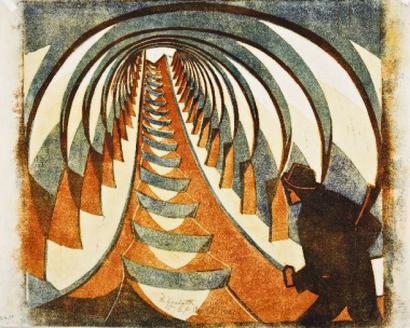
Escalator
Cyril Power
c. 1929
_______________________
beckett the nietzschean hedonist
Richard Marshall.
3am
(....)
Amidst the plethora of readings that shuffle the postmodern pack is Foucault. Foucault is an enduring hinge thinker in this sort of discussion, connecting the commonly asserted trope associating the Nietzschean death of God with the Barthean/Derridean postmodernist death of the author. The move from postmodern to existentialist readings of Beckett are virulent, where the desire for meaning in a context of nihilism and absurdism become the common ground for Beckettian philosophical musings. Martin Esslin’s seminal book ‘The Theatre of the Absurd’ captures this approach. Simon Crichley’s idea of meaninglessness being asserted again and again as a moral test is just a late, reheated moment in this tradition which bemusingly adds an ascetic morality test into the mix that really has no place anywhere near Nietzsche or Beckett.
...(more)
_______________________
Why Philosophy?
Peter Hacker
Philosophy as Conceptual Border Patrol
Jay Jeffers
_______________________
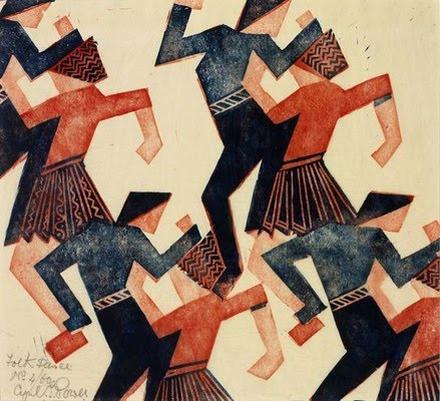
Folk Dance
(1928)
Cyril Power

The Morning after the Deluge
c. 1843
Joseph Turner
_______________________
Each day, our porous skin opens less and less to fresh air, sunlight, the touch of others, the smell of pine, rain, compost, and manure . . . and instead we find ourselves hunched over machines in the standard posture of reverence, bowing our heads to the humming and warm computer-pets that rest on our laps or in our palms.
Panting for Breath on a Virtual Shore
We are no longer homo sapiens: we're cyborgs.
Stefanie Krasnow adbusters
(....)
Our common understanding of cyborgs are hollywood clichés: rogue robots with human skin pulled taut over sleek metal wiring, and ON/OFF buttons tucked away in thigh or knee crevasses. But we don't have to wait until we embed chips beneath our skin, nor till we get Google Goggles as contact lens glued to our eyes, to earn our status as cyborgian. As Donna Haraway famously suggests, we are entirely cyborgs just as we appear now – with smart-phones tucked snugly in our pockets for every minute of every waking hour, held as close as possible to our skin in a hard-to-access area, much like a sacred amulet was once worn around one's neck in a burlap pouch.
In her Cyborg Manifesto, Haraway collapses the boundaries between human/animal, and human/machine, suggesting that there is as much artifice as there is "nature" in human nature. Our cyborgian condition was not begot by some sinister mutation, rather, we are as vitally and ineradicably entwined with machines as we are with the bacteria in our intestines. As Marshall McLuhan said: "we create machines in our own image and they, in turn, recreate us in theirs."
...(more)
_______________________
Two Poems
Matthew Sweeney
The Strong Man
The strong man ran away from the circus
because the lion wouldn’t love him.
He wandered into a forest, and began
uprooting trees. A badger stared at him.
An owl woke up. The man ignored both.
He weaved, howling, through the trees
at top speed, sending squirrels scattering,
till he came to a small, circular lake which
he dived into and swam to the centre.
...(more)
_______________________

He Who Gets Slapped
1924
video
He Who Gets Slapped: A Play in Four Acts
Leonid Andreyev
.....................................................
He Who Gets It
Joseph Jon Lanthie
interpolates responses to the Victor Sjöström film He Who Gets Slapped and the Charles Mingus/Jean Shepherd composition "The Clown".
(....)
- You have an irrational fear of exaggeratedly loose clothing, of obsequiousness, of performing before audiences, and of having your blood drawn with a hypothermic needle.
– Isn’t the gaze of an audience a needle of sorts—a tool with which non-fungible essence is extracted? Mightn’t the robes of an ordinary man fit perfectly, if not snugly, while those of the veteran clown sag comically from his shoulders? And can we not imagine the garments of this buffoon careerist clinging respectfully to his younger, fuller self? Is it perhaps not the clothes that change but the man—having exposed himself to crowds that ravenously feed upon his spectacular corpus? Is not their applause manipulative, a form of praise for which the performer can only pay with an ineffable piece of himself that he mayn’t replenish?
- You have an irrational fear of condescension, and are prone to presuming you are being condescended to.
– Don’t we all deign to speak to one another? Isn’t conversation simply another performance, one that is mutually enervating, the goal of which is to suck more from your company than he or she or they might suck from yourself? Is not the dormant conversationalist, while pausing to hear out his partner for the moment, less receiving than absorbing—draining, in a sense, his others?
- You have an irrational fear of having your blood drawn with a hypothermic needle, and of that which is not hypothetical.
...(more)
_______________________

The Evening Star
Joseph Turner
(ca. 1830)
_______________________
Fellow Travelers
Bhaskar Sunkara
jacobin
(....)
The choice facing us isn’t between the blind worship of our particular pantheon of dead white men or Daily Kos-style ecumenicism. After all, the problem with the Left isn’t that it’s too austere and serious; it’s that it doesn’t take itself seriously enough to make the changes necessary for political practice. We can be rigorous and ideological — without being afraid of being heard outside our own circles. Mass exposure wouldn’t spell the end of a vibrant socialist critique.
But to get to the root of the problem will take an organizational revolution, not just a cultural one. We’re weird, because we’re not accountable to any mass constituency, not because we didn’t watch enough cable growing up.
Okay, maybe that too.
But it’s impossible to deny that institutionally the socialist left is in disarray, fragmented into a million different groupings, many of them with essentially the same politics. It’s an environment that breeds the narcissism of small differences. In a powerless movement, the stakes aren’t high enough to make people work together and the structures aren’t in place to facilitate substantive debate.
The prospect for left regroupment was one of my main motivations for founding Jacobin. Yet the watchwords of this project have seldom appeared in our pages. It’s finally time to make a call for joint action on the Left with an eye towards the unification of the many socialist organizations with similar political orientations into one larger body.
...(more)
No Short-Cuts: Interview with the JacobinIDIOM .....................................................
Dead White Reds
Matt Karp
jacobin “The tradition of all the dead generations,” Marx wrote a 150 years ago, “weighs like a nightmare on the brain of the living.” Today, with our politics trapped in capitalism’s endless fugue state, the nightmare that troubled Marx may seem to contemporary left-wingers like a pleasant dream of days gone by.
At least the dead generations took Marx seriously. At least they had a powerful labor movement and center-left parties that believed in the welfare state. And at least Ralph Miliband, the dead leftist whose son is the living leader of Britain’s Labour Party, would never have answered a question about capitalism with a grudging obeisance to the creative power of BlackBerry.
It’s easy to get nostalgic.
A longer glance back into the past should cure us of this sentimentalism....(more)
_______________________

Sunset
c.1820-30
Joseph Turner
b. April 23, 1775
_______________________
Harmony Korine’s Disneyland dystopia Spring Breakers
eight critical essays at The New Inquiry
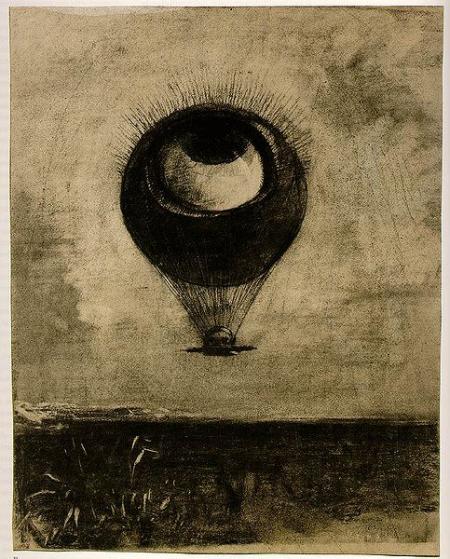
Eye-Balloon
1898
Odilon Redon
(April 20, 1840 – July 6, 1916)
_______________________
First Monday
Volume 18, Number 3 - 4 March 2013
Understanding social media monopolies
Silence, delirium, lies?
Caroline Bassett
Abstract
One way to undermine social media monopolies is to refuse to contribute to the communicational economy they are based upon: don’t generate exploitable signals, stay quiet — and ask how this might be developed as a common response. Given the naturalized assumption that ‘more communication’ will automatically produce ‘more freedom’, suggestions, like this one, that are based on doing less of it might provoke hostility. However, in the case of the social media industries, communication is cultivated not in the interests of freedom, but in the interests of growth; social media wants to capture more of you through your transactions. Moreover, through this process communications are not made ‘more free’ but tend rather to become less open — certainly in the sense that they are commoditized. With this in mind, this paper asks if a media politics might be generated based on the potentials of silence, on speaking in tongues — and on relying on the resources of metaphorical language rather than on learning to speak or write in ways more amenable to code.
Society doesn't exist
Jodi Dean
Abstract
This paper considers three versions of the claim that society doesn’t existence in order to investigate the problem of the idea of the social in social media. It identifies a convergence between the claims that society doesn’t exist and the social media we have. Yet it notes a disjunction between the media we have and the arguments of net critics and activists who say the problem is centralization and that what we need is individual control. Against this position, the paper argues for the relation between dispersion and centralization and the political potential manifest in centralization insofar as it makes apparent the social relations between people at the core of production.
Facebook.com text: Industrialising personal data production
Korinna Patelis
Abstract
This article examines Facebook.com as a cultural text. It casts a critical eye on the stories told by the Facebook monopoly interphase, focusing on how these intergrate commerce with communications. It struggles with the text’s key abstractions arguing that Facebook industrialises personalised data production by demanding the constant production on customised communcation objects.
_______________________
Can’t say it’s not spring
Katri Tapola
illustrations by Virpi Talvitie
Translated by Lola Rogers
from Mahdottomuuksien rajoissa. Matkakirja ('In the realm of impossibility. A travel book'
books from Finland
Off-kilter self-image
There are those among us who are over-exposed, under-exposed, unfocussed, or a bit 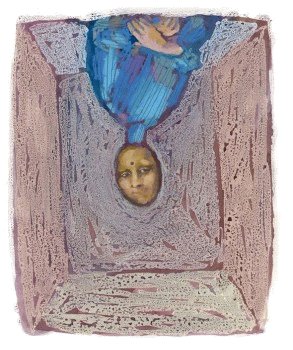 smudged, and then there are those with a self-image that’s out of kilter. The possessor of an off-kilter self-image is usually the victim of long-term exposure to binders, label-makers, and hole-punchers. Their off-kilterness is due to the evasive action that the person has constantly been taking for fear of becoming bound, labelled, and punched through with holes. A life that is out of kilter in the self-image is blurry: it’s hard to find the right door or sit down to coffee with gusto because you feel that a) someone’s going to pull the chair out from under you, or b) you yourself are going to miss the chair and pratfall to the floor. You may completely bypass happiness in the fog. When a passer by looks you in the eye and smiles, you may think they’re aiming right past you. There’s a simple solution to this problem: take a new picture. A self-image that stays put is best made using a long exposure time. The easiest way to do this is to get a cardboard box from your local grocery – anything will do, a pineapple box, whatever – and build your own pinhole camera, or camera obscura. This technique is sure to work. Just seat the off-kilter person in a chair and aim the pinhole camera at them. With long exposure time, the spine of the out-of-kilter person will seem to straighten of its own accord, since you can’t flinch or slouch. The image inside the camera will look upside down, and that is precisely the point. The person portrayed on the paper will glow with light and become translucent – the bones, the spreading wings. You will see yourself for the first time. There I am, you’ll laugh, born from the light! Then you’ll open the right door, meet someone’s gaze and return it, like a child or some other equally wondrous thing. smudged, and then there are those with a self-image that’s out of kilter. The possessor of an off-kilter self-image is usually the victim of long-term exposure to binders, label-makers, and hole-punchers. Their off-kilterness is due to the evasive action that the person has constantly been taking for fear of becoming bound, labelled, and punched through with holes. A life that is out of kilter in the self-image is blurry: it’s hard to find the right door or sit down to coffee with gusto because you feel that a) someone’s going to pull the chair out from under you, or b) you yourself are going to miss the chair and pratfall to the floor. You may completely bypass happiness in the fog. When a passer by looks you in the eye and smiles, you may think they’re aiming right past you. There’s a simple solution to this problem: take a new picture. A self-image that stays put is best made using a long exposure time. The easiest way to do this is to get a cardboard box from your local grocery – anything will do, a pineapple box, whatever – and build your own pinhole camera, or camera obscura. This technique is sure to work. Just seat the off-kilter person in a chair and aim the pinhole camera at them. With long exposure time, the spine of the out-of-kilter person will seem to straighten of its own accord, since you can’t flinch or slouch. The image inside the camera will look upside down, and that is precisely the point. The person portrayed on the paper will glow with light and become translucent – the bones, the spreading wings. You will see yourself for the first time. There I am, you’ll laugh, born from the light! Then you’ll open the right door, meet someone’s gaze and return it, like a child or some other equally wondrous thing.
_______________________
“Coffee glides into one’s stomach and sets all of one’s mental processes in motion. One’s ideas advance in column of route like battalions of the Grande Armée. Memories come up at the double, bearing the standards which will lead the troops into battle. The light cavalry deploys at the gallop. The artillery of logic thunders along with its supply wagons and shells. Brilliant notions join in the combat as sharpshooters. The characters don their costumes, the paper is covered with ink, the battle has started, and ends with an outpouring of black fluid like a real battlefield enveloped in swaths of black smoke from the expended gunpowder. Were it not for coffee one could not write, which is to say one could not live.”
— Balzac
Coffee!!!Daily Rituals Entry 4 Mason Currey
_______________________

Berkeley #57
Richard Diebenkorn
(April 22, 1922 – March 30, 1993)
_______________________
Poems
Stephen Dunn
The Cortland Review
If A Clown
If a clown came out of the woods,
a standard looking clown with oversized
polkadot clothes, floppy shoes,
a red, bulbous nose, and you saw him
on the edge of your property,
there'd be nothing funny about that,
would there? A bear might be preferable,
especially if black and berry-driven.
And if this clown began waving his hands
with those big, white gloves
that clowns wear, and you realized
he wanted your attention, had something
apparently urgent to tell you,
would you pivot and run from him,
or stay put, as my friend did, who seemed
to understand here was a clown
who didn't know where he was,
a clown without a context.
What could be sadder, my friend thought,
than a clown in need of a context?
...(more)
_______________________

Spirit of Forest
(Specter from Giant Tree)
Odilon Redon
1880
_______________________
The Right to Be Forgotten: A Comparative Analysis
Laura Lagone
Abstract:
Before the Internet, people could make mistakes without the fear of being haunted by them in the future. Embarrassing information was usually contained in one’s community and typically forgotten over time. At the extreme, one could always move to a new neighborhood or find a new job in order to start fresh. In today’s Internet age, however, it is no longer easy to escape one’s past when personal information can go viral in a matter of minutes, search results retain old information, and more data gets stored in the cloud.
_______________________

Battlefield
1907
Käthe Kollwitz
(July 8, 1867 - April 22, 1945)
_______________________
... all of our experience suggests that it is not “fundamentalism” alone but an aching tension between modernity and a false picture of a purer fundamentalist past that makes terrorists.
(....)
The toxic combination of round-the-clock cable television—does anyone now recall the killer of Gianni Versace, who claimed exactly the same kind of attention then as Dzhokhar Tsarnaev did today?—and an already exaggerated sense of the risk of terrorism turned a horrible story of maiming and death and cruelty into a national epic of fear. What terrorists want is to terrify people; Americans always oblige.
Experts tell us the meaning of what they haven’t seen; poets and novelists tell us the meaning of what they haven’t seen, either, but have somehow managed to fully imagine. Maybe the literature of terrorism, from Conrad to Updike (and let us not forget Tolstoy, fascinated by the Chechens) can now throw a little light on how apparently likable kids become cold-hearted killers. Acts of imagination are different from acts of projection: one kind terrifies; the other clarifies.
— Adam Gopnik
_______________________

Ocean Park No. 130
1985
Richard Diebenkorn
_______________________
A Place in the Country
WG Sebald
An extract from the first English translation of a collection of WG Sebald's essays
Translated by Jo Catling.
At the end of September 1965, having moved to the French-speaking part of Switzerland to continue my studies, a few days before the beginning of the semester I took a trip to the nearby Seeland, where, starting from Ins, I climbed up the so-called Schattenrain. It was a hazy sort of day, and I remember how, on reaching the edge of the small wood covering the slope, I paused to look back down at the path I had come by, at the plain stretching away to the north crisscrossed by the straight lines of canals, with the hills shrouded in mist beyond; and how, when I emerged once more into the fields above the village of Lüscherz, I saw spread out below me the Lac de Bienne, and sat there for an hour or more lost in thought at the sight, resolving that at the earliest opportunity I would cross over to the island in the lake which, on that autumn day, was flooded with a trembling pale light. As so often happens in life, however, it took another 31 years before this plan could be realised and I was finally able, in the early summer of 1996, in the company of an exceedingly obliging host who lived high above the steep shores of the lake and who habitually wore a kind of captain's cap, smoked Indian bidis and seldom spoke, to make the journey across the lake from the city of Bienne to the island of Saint-Pierre, formed during the last ice age by the retreating Rhōne glacier into the shape of a whale's back – or so it is generally said. The ship which took us along the edge of the Jura massif where it plunges steeply into the lake was called the Ville de Fribourg. Among the other passengers on board were the gaudily attired members of a male voice choir, who several times during the short crossing struck up from the stern a chorus of "Ląhaut sur la montagne, Les jours s'en vont" or another such Swiss refrain, with the sole intention, or so it seemed to me, of reminding me, with the curiously strained, guttural notes their ensemble produced, of how far I had come meanwhile from my place of origin....(more)
_______________________

Flower Clouds
c. 1903
Odilon Redon
_______________________
Out of the Cradle Endlessly Rocking
Walt Whitman
Out of the cradle endlessly rocking,
Out of the mocking-bird's throat, the musical shuttle,
Out of the Ninth-month midnight,
Over the sterile sands and the fields beyond, where the child
leaving his bed wander'd alone, bareheaded, barefoot,
Down from the shower'd halo,
Up from the mystic play of shadows twining and twisting as if they
were alive,
Out from the patches of briers and blackberries,
From the memories of the bird that chanted to me,
From your memories sad brother, from the fitful risings and fallings I heard,
From under that yellow half-moon late-risen and swollen as if with tears...
...(more)
Basil Bunting chants Whitman
mp3

photo - mw
_______________________
Steampunk Zone
Carmine Starnino
from Carmine Starnino’s Lazy Bastardism, Gaspereau Press, 2012
Lemon Hound
In our mashup-mad era, we yearn for unpigeonholeability. We don’t want to be different. We want to be weird. We want to be total category-killers. As a result, it’s hard to find a poet – free-versifier and formalist alike – who doesn’t believe at heart that he or she is far too heterodox to be trapped in existing definitions of traditional and experimental. Contemporary poetry now comprises a vast invented form: the godknowswhat.
That the selections in Best Canadian Poetry in English 2012 echo and reprise this yearning should come as no surprise. From Rachel Lebowitz’s unnerving, nursery rhyme-inflected prose cycle (‘Cottonpolis’) to Robert Earl Stewart’s smoky, image-loaded stream of consciousness (‘A Wind-Aided Fire’), this book is a mixed bag. It’s the outcome, one might say, of a collective decision taken by Canadian poets to dart in all directions at once. To be sure, I plucked these poems from print and online journals with no bias except to find verse that provided a fresh entry into reality; that offered something, some equivalence between sound and feeling, I didn’t already know, or couldn’t find elsewhere. Good poets are stylists, and I hunted for styles whose distinctive qualities generated memorable insights. Yet, when assembled, many of the one-of-a-kind elements I admired – which each seemed unexpected, an emergency measure – turned out to share the same triggers. It made me uneasy. Don’t misunderstand: these are wickedly good poems. But the task of finding them has forced me to reflect on the high price of writing under the influence of what F.R. Leavis would have called our ‘poetical modes’.
(....)
Canadian poetry seems ideally suited to this era. Its masterworks, such as Irving Layton’s ‘A Tall Man Executes a Jig’ or A.M. Klein’s ‘A Portrait of the Poet as Landscape’, have always been marked by a glorious miscegenation of influences; or, to use Peter Van Toorn’s words from his 1985 book Mountain Tea, ‘there’s always a carnival voice?/calling you inside to see the choice?/of goods usually hawked at the honeyed?/gates of paradise’. Heeding this carnival voice has turned the recent scene into a teeming bazaar, where younger poets proudly wear the bright, patchwork clothes of their cosmopolitan nurturing. But something else defines this group. They are the first generation for whom the battle lines of mainstream versus avant-garde (what an earlier time dubbed ‘cooked’ and ‘raw’) have outlived their usefulness. The intense need to set free a shifting sense of self has helped produce the unusual range of devices in this book: intricate puns, up-to-the-minute slang, scat-singing wordplay, many-sided metaphors. These devices are brandished by poets who have not only come out the other side of the poetry wars, but aspire to heal the divisions in their poems. We see this in the cerebral, cubist elegance of Lisa Robertson’s ‘Scene’ or the flagrantly self-conscious, gear-switching rhymes of Shane Rhodes’ ‘The Paperweight’ or the ludic largess of Adam Dickinson’s ‘Call to Arms’. These poets belong to a circle that aggressively resist schools, unsettles assumptions and crossbreeds near-infinite varieties of form, from rhyme-rich free verse to mishmashes of lyric and found texts.
...(more)
_______________________
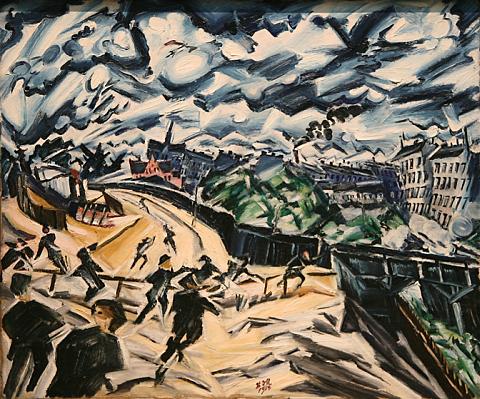
Apocalyptic landscape
1913
Ludwig Meidner
(18 April 1884 – 14 May 1966)
_______________________
Border Control in America before Ellis Island
Hidetaka Hirota
While Ellis Island is now widely recognized as a historical icon of the American immigration experience, some important questions remain to be addressed. Where did federal immigration regulation law come from? How was immigration to the United States regulated prior to Ellis Island? What was the relationship between earlier practices of immigration control and federal regulatory policy that developed from the late nineteenth century onward?
...(more)
_______________________
"A Once Perfect Day for Bananafish "
Mieko Kawakami
Translated by Hitomi Yoshio
Electric Literature's Recommended Reading
THE OLD WOMAN ON THE BED AT THE END OF HER LIFE, the true, absolute end. In a faint flicker, she dreams a dream all in yellow. A yellow, hot summer’s day. The old woman lives there, in the faint flicker.
In her bedroom piled with familiar objects, all we know are the bits and pieces that have kept on piling up. On this day of absolute solidity, in our eyes, she has lived for so long. The curtains always half-closed, at times matching her eyelids. In our eyes, the old woman lies still. In our eyes, the old woman lies still for a long, long time. Very lying still on the bed.
(....)
The old woman on the bed at the end of her life, the true, absolute end. In a faint flicker, she dreams a dream all in yellow. A yellow, hot summer’s day. The old woman lives that day, in the faint flicker.
...(more)
originally appeared in Monkey Business_______________________

photo - mw
_______________________
Monday
Lisa Robertson
from the weather
First all belief is paradise. So pliable a medium. A time not very long. A transparency caused. A conveyance of rupture. A subtle transport. Scant and rare. Deep in the opulent morning, blissful regions, hard and slender. Scarce and scant. Quotidian and temperate. Begin afresh in the realms of the atmosphere, that encompasses the solid earth, the terraqueous globe that soars and sings, elevated and flimsy. Bright and hot. Flesh and hue. Our skies are inventions, durations, discoveries, quotas, forgeries, fine and grand. Fine and grand. Fresh and bright. Heavenly and bright. The day pours out space, a light red roominess, bright and fresh. Bright and oft. Bright and fresh. Sparkling and wet. Clamour and tint. We range the spacious fields, a battlement trick and fast. Bright and silver. Ribbons and failings. To and fro. Fine and grand. The sky is complicated and flawed and we’re up there in it, floating near the apricot frill, the bias swoop, near the sullen bloated part that dissolves to silver the next instant bronze but nothing that meaningful, a breach of greeny-blue, a syllable, we’re all across the swathe of fleece laid out, the fraying rope, the copper beech behind the aluminum catalpa that has saved the entire spring for this flight, the tops of these a part of the sky, the light wind flipping up the white undersides of leaves, heaven afresh, the brushed part behind, the tumbling. So to the heavenly rustling. Just stiff with ambition we range the spacious trees in earnest desire sure and dear....(more)
.....................................................
The day pours out space (PoemTalk #65)
Lisa Robertson, "The Weather" ("Monday")
Rachel Blau DuPlessis, Kristen Gallagher, and Michelle Taransky
_______________________

photo - mw
_______________________
Anselm Hollo: 1934 – 2013
Rudy Rucker
exquisite corpse
(....)
I first heard of Anselm Hollo in 1972 when my writer friend Gregory Gibson mailed me a copy of that pamphlet-like book or chapbook, Sensation , published by a group calling themselves the Institute of Further Studies, in Gloucester, Massachusetts, traditional home of outrider poets such as Greg himself and of course Charles Olson. Not that Anselm was living in Gloucester. Born and to some extent raised in Finland, he was at this point drifting around the US from one visiting-poet gig to the next.
I read Sensation over and over, fascinated by its colloquial style and by Hollo’s trick of putting more than one twist into each poem—later when I met him he once remarked of some other poet’s work, “Just has one twist at the end, that’s not enough.”
Anselm’s poems are nicely musicked, yet elliptical and hard to pin down. What do they mean? No matter, never mind.
(....)
Anselm had an encyclopedic knowledge of world literature, and an exquisite mastery of the spoken word. He was wonderfully serious about writing. Whenever I was with him, I felt like I was talking to a sage on Mount Olympus, not that there was anything solemn about him. He’d often break into wheezing laughter while we were batting the ideas around. He had a cosmopolitan accent, having grown up Finnish. Anselm once remarked that every Finn deserved to have a biography written. But Anselm’s short, pungent poems are the most accurate memoirs of all, like X-ray snapshots of instantaneous mental states.
...(more)

Rowboats on the Estuary
1929
Alma Lavenson
1897 - 1989
1 2
_______________________
Fanaticism:
To Write A History Of A Thing Without History
Alberto Toscano
Preface to Fanaticism (2013)
verso
This first millennial decade, captivated by a spectacular, if ambiguous, resurgence of religiously motivated violence, has seen the revival of a charged term in the Western political lexicon: fanaticism. Societal upheavals, revolutionary periods, religious wars, crises of legitimation, imperial projects – in the past five centuries, all have provided occasions for invoking fanaticism to stigmatise incorrigible enemies, whose disproportionate convictions and intractable beliefs put them beyond the pale of negotiation. Millenarian German peasants, anti-colonial ‘dervish’ rebels, terrorising Jacobins, anarchist bombers, anti-slavery ‘immediatists’, and eschatological Stalinists are just some of the figures thrown up by an investigation into the adversarial uses of this powerful idea. Exploring the historical semantics and polemical deployments of fanaticism reveals, among other things, its impressive plasticity. Cultic superstition and unbridled rationality, the refusal of progress and its immoderate celebration, intransigent particularism and expansive universality have all been the targets of the accusation of fanaticism.
(....)
In writing Fanaticism, I set myself two peculiar and paradoxical challenges. First, to write a history of a thing without history. The discourse about fanaticism is not only almost invariably condemnatory, it also treats it as a fundamentally ahistorical pathology of religious and political life. Whence the ease with which it launches into analogies torn from historical or geographical context: the Radical Reformation of Thomas Müntzer is twinned with the political regimes of Nazi Germany and Bolshevik Russia, Khomeini rubs shoulders with the Florentine heretic Girolamo Savonarola, ancient Roman goddess cults (from which we get the term fanatici) prefigure anti-colonial rebellions. Our ruling ideologues’ 'arcs of extremism' and 'axes of evil' sit comfortably within this tradition. Second, I tried to explore one of the most polemical and obfuscatory terms in our political vocabulary to gain some orientation into the political challenges and possibilities of our contemporary condition.
...(more)
_______________________

Mother Lode
Church, China Camp
1939
Alma Lavenson
_______________________
from Odes: 15 ["Nothing"]
Basil Bunting
Nothing
substance utters or time
stills and restrains
joins design and
supple measure deftly
as thought’s intricate polyphonic
score dovetails with the tread
sensuous things
keep in our consciousness.
Celebrate man’s craft
and the word spoken in shapeless night, the
sharp tool paring away
waste and the forms
cut out of mystery!
When taut string’s note
passes ears’ reach or red rays or violet
fade, strong over unseen
forces the word
ranks and enumerates...
mimes clouds condensed
and hewn hills and bristling forests,
steadfast corn in its season
and the seasons
in their due array,
life of man’s own body
and death...
The sound thins into melody,
discourse narrowing, craft
failing, design
petering out.
Ears heavy to breeze of speech and
thud of the ictus.
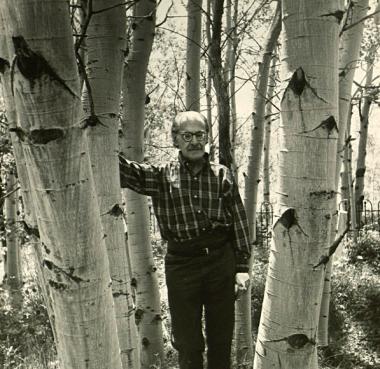
Basil Bunting
photo by Jonathan Williams
d. 17 April 1985
1 2 3
on Basil Bunting
Tony Baker
THE CAREER of Basil Bunting, who would have been one hundred this year, is now sufficiently well-known that it hardly needs repeating: co-dedicatee in 1934 with Louis Zukofsky of Pound’s Guide to Kulchur, he remained a ‘struggler in the wilderness’ until his mid-sixties when the publication of Briggflatts, his last substantial poetic work, brought belated critical recognition of his centrality to any version of Modernism in the literature of Britain in the twentieth century.
A list of his contacts and influences is a rollcall of essential figures: apart from Pound and Zukofsky, one could mention Yeats, Eliot, Ford Madox Ford, David Jones, MacDiarmid, Mina Loy. He knew his work would stand comparison with any and throughout the years of neglect trimmed and cut and threw away with the kind of conviction that only a poet utterly assured of his craft could manage; so that his complete poems — augmented in the present edition to include all the writings he more or less released in his lifetime — remains, like the editions he personally oversaw, a relatively slim volume.
(....)
His craft at root derives from that simple motive: to communicate, to please, with patterns of sound. Readers can try to build whatever edifice they like on this foundation, but they would misread Bunting if they ignore it. Fortunately we don’t have to. A reader who hesitates to follow Bunting’s advice to the letter — read aloud — has now two cassettes of him reading his own work easily available, plus the texts of a series of lectures he gave at Newcastle between 1969 and 1974 in which he reveals how his own reading in the history of English poetry is an extraordinary hearing of verse....(more)
_______________________

Jail
Coloma
Alma Lavenson
1947
California Gold Rush Mining Towns
Photographed by Alma Lavenson
1930-1968
Online Archive of California
_______________________
Biohazard
The Catastrophic Temporality of Green Capitalism
Ashley Dawson
Abstract
Contemporary modes of biopolitical manipulation and commodification entail a radically new political economy of nature, a wholesale shift from the laws of biological evolution and development that have subtended much of the temporal imagination of modernity. In place of the notions of gradual but progressive growth that characterized the industrial age, extreme, fractal changes increasingly characterize our biopolitical age. We live in an era of catastrophic time. If most policy makers seem intent on ignoring or exacerbating the perils of the Anthropocene age, popular culture is gruesomely entranced by the possibility of civilizational collapse. Works of speculative fiction such as Atwood’s The Year of the Flood, on which this essay focuses, play a critically important role today by making the new extreme scales of biopolitical exploitation visible, speeding up the impact of contemporary modes of biocommodification to show their likely denouement in dystopian futures.
Social Text Volume 31, Number 1 114, Spring 2013 _______________________
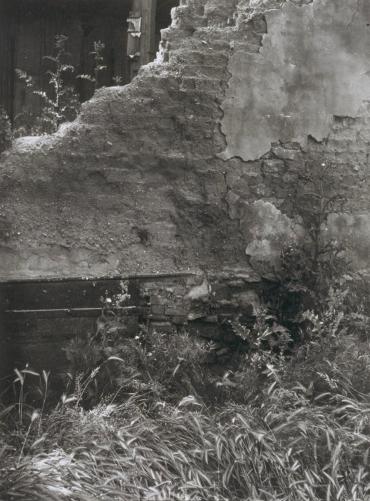
Brick and adobe wall
Bear Valley
Alma Lavenson
1936
_______________________
New Walls in the Information Age
Alphonso Lingis
Social Identities
Vol. 11, No. 3, May 2005
(....)
Today the very nature of the media sweeps away the past. The instantaneous nature of television reporting holds our eyes gaping upon the future hot before us. Newspapers and magazines keep us breathless in the expectation of new inventions in cancer research, in mineral sciences, in energy production, in genetically altered food crops. The marketing industry excites us for new comfort and safety in personal transportation, new facilities in home cooking and entertainment, new pleasures in furnishing and clothing. As a result we have the sense that what mergers and contracts are being made, what inventions patented in Houston, Silicon Valley, the Ruhr, Lyon, Milan, Tokyo-Osaka, Shanghai, Taipei, Seoul, Mexico City, and Sao Paulo are important, will determine our lives. Societies that are still clinging to the allegedly discredited socialism or welfare state or that are not speeding up the allegedly needed market reforms are dismissed with impatience as backward.
There is another factor; it is that our immediate past forms a black wall that cuts us off from our forefathers and our ancestors. The immediate past of rich countries is the two wars in which they embroiled the whole world. And since then, so many lands where layers of older civilizations persisted slaughtered their populations in the same way. So many millions of people gassed, incinerated, buried in mass graves, disappeared. There are today so many of us who have no idea where or how our parents were disappeared. And so many of us no longer communicate with our fathers and forefathers; we no longer hear what they learned.
Alphonso Lingis Essay Collection
mediafire pdf
_______________________
from Briggflatts
Basil Bunting
(....)
Every birth a crime,
every sentence life.
Wiped of mould and mites
would the ball run true?
No hope of going back.
Hounds falter and stray,
shame deflects the pen.
Love murdered neither bleeds nor stifles
but jogs the draftsman’s elbow.
What can he, changed, tell
her, changed, perhaps dead?
Delight dwindles. Blame
stays the same.
Brief words are hard to find,
shapes to carve and discard:
Bloodaxe, king of York,
king of Dublin, king of Orkney.
Take no notice of tears;
letter the stone to stand
over love laid aside lest
insufferable happiness impede
flight to Stainmore,
to trace
lark, mallet,
becks, flocks
and axe knocks.
...(more)
Basil Bunting reading from 'Briggflatts'youtube_______________________

photo - mw
_______________________
Notebook (Merrill Gilfillan, Brian Blanchfield, &c.)
an interview with Merrill Gilfillan
John Latta presents an excerpt from the Chicago Review
(....)
You use the word “refraction” to describe a kind of poem that isn’t worthy of the terrain you know, and, applied to poetry the word indicates to me a kind of splintering focus, an aloof indirectness, oblique, even dodgy. Is that it? Could you say more about what sort of foolishness there is in poetry that vast places do not brook? Is a refracting poem foolish because it too strenuously manages the poem’s materials?
Not that refraction in itself is “foolish,” but that its taproot connection with a kind of slippery irony and wink of the eye can, at its worst, lead to an endlessly coy jockeying. By refraction I mean a kind of writing that carries in its premise a partial removal from direct referential communication. Refraction (amplified definition): “Deflection from a straight path undergone by a light ray (words) passing from one medium (air / mind) to another (glass / ink).” The process involves pushing one’s writing through a conceptual mesh that adds a subtle bossing or hatching to the tenor of the words, an inflection that lends a sort of stylish linguistic distance and autonomy to the text. As a high-profile example, most all of John Ashbery’s poems seem to me highly refracted; Frank O’Hara’s, not.
...(more)

Godfrey Frankel
1912–1995
1 2 3
_______________________
In the Digital Era, Our Dictionaries Read Us
Jennifer Howard
_______________________
Lift This End: Electronic Literature in a Blue Light
Stuart Moulthrop
electronic book review
Since this is a paper about the computational context of literary writing, and to some extent poetry, I have invested heavily in metaphor, at least as far as the title is concerned. Taking key terms in no particular order: by end I mean not so much terminus as singularity or convergence of opposites, that defining, indefinable point where turn becomes return as one state gives way to another; from the imperative lift, I take both the sense of elevation or burdening (lift up) and appropriation (shoplifting); and by the numinous article this, I will eventually mean the inescapable subject of electronic literature, the this of which (for which) some end may yet be lifted. As for that blue light, it is, for the moment at least, a retina-scorching light-emitting-diode on the faceplate of my personal computer, registering wireless connection to the empire of signs. To this shining subject we will inexorably return.
Meanwhile, some sad news. ...(more)
_______________________

photo - mw
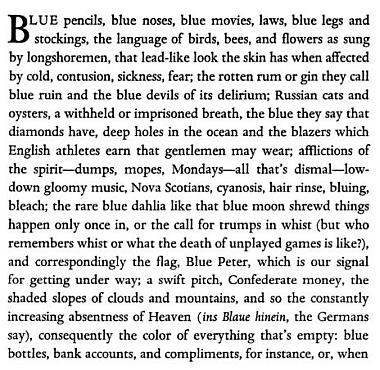
On Being Blue: A Philosophical Inquiry
William Gass
google books
_______________________
William H. Gass, post-post-everything author
Benjamin Weissman
... Thank God that morality for Gass is the ugly truth laid bare, grotesqueries and all, and that simple punishments, happy endings, and “lessons learned” are not suitable for the big reality of his fiction. What he has to say about humanity is communicated not by plot but through the radical vitality and violent inventiveness of his language.
Gass’s relationship to language is at once baroque, modernist, and extremely post-post-everything. He’s bent and invented more words in English than any wordsmith I can think of. His “On Being Blue,” a meditation on the color blue, is one of the most unique philosophical poetic riffs in world literature. Gass is so often pure music. You can’t find a single book review or any of his utterances in print where he’s not totally on point, being beautiful and perfect with his prose. Over the course of a 60-year career, his style and big fat word riffing has never dropped, nor has his tonal range narrowed.
(....)
In the revised and expanded preface to his first collection of stories, “In the Heart of the Heart of the Country and Other Stories,” William Gass writes about searching for the better word, since in his mind there always is a better one, and that insistence, that personal demand and writerly pressure, is central to his achievement as a fiction writer and critic. That contract with himself has also influenced several generations of writers. David Foster Wallace comes to mind. But his effect on other writers is not as traceable as the Barthelme-absurdist influence. Gass’s heirs are diffuse, his lineage is less specific, his talents, the full complex rainbow; those who’ve fallen under his spell have also spread far and wide.
(....)
Life-long readers of Gass know this: the man has never written a sentence that isn’t astonishing. He has the humility, scope, and all-embraciveness of Montaigne, the promiscuity of Bataille, and he is a despiser of plots. Conventional narrative is like rat poison to Gass. Not in my house, not on my page has always been his wide postmodern stance. Conventional narrative, to him, is the great stifler. It sends the wrong message to the world, of rigidity and unpleasant imposed order, manipulative hygiene that smells like ammonia. For Gass, conventional narrative kills the life inside language....(more)
_______________________
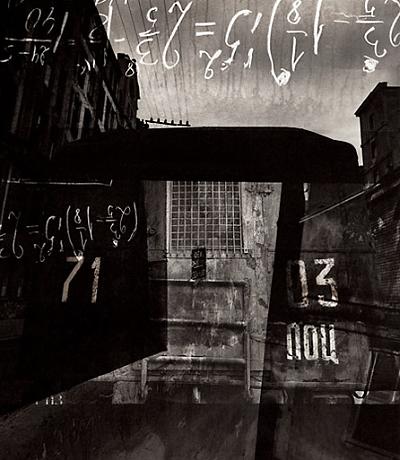
Nomenclatura of signs
Alexey Titarenko
_______________________
The enduring myth of the Greedy Geezer
The press too easily accepts the young vs. old frame on the Social Security debate
Trudy Lieberman
Columbia Journalism Review
... for the most part, the press has been presenting a one-sided picture of the Social Security situation, quite possibly to the detriment of young and the old alike. From other perspectives, the two generations are not in opposition at all, but natural allies, both with common interests in a strong Social Security system.
But you wouldn’t know anybody thought that way by reading much of the press, and not just the conservative press.
(....)
The idea of generational warfare is almost as old as Social Security itself. Back in Eisenhower’s time the long knives were out for the program, prompting Ike to write to his brother:
Should any political party attempt to abolish Social Security and eliminate labor laws and farm programs, you would not hear of that party again in our political history. There is a tiny splinter group, of course, that believes you can do these things. Their number is negligible and they are stupid.
Those were the days before the Koch Brothers, Peter G. Peterson, and the vast sums they and others lavished on conservative think tanks to provide the intellectual ammo for propelling their ideas into the public’s thinking.
...(more)
_______________________
The freedom of the fox in the chicken run
A conversation with novelist Nicholas Bradbury
author of "Market Farm", a reworking of George Orwell's "Animal Farm" for the free market era.
eurozine
(....)
Philosophically, everyone in the West is mainly influenced by Plato and the Bible, whether they realize it or not, or like it or not. Subconsciously, Hans Magnus Enzensberger's wonderful poem, "Hirudo sanguisuga oder: Analekten zur Staatsbürgerkunde" must have been the seed of the idea. Swift probably was an influence stylistically. I don't think satire gets better than Swift. It may be that Kurt Vonnegut and Martin Amis, who are also very funny in a philosophical way, had an influence. Other than that, it is hard to say. Among economists, I suppose Marx, Keynes and Galbraith have been more influential on me than Smith and Hayek. But I'm not an economist, so I'm not sure how directly influential they will have been. I think I see things more simply, and as a linguist focus more on the role of ideology, how this shapes the political process, through language....(more)
_______________________

(Library of Congress)
I sit astride life like a bad rider on a horse.
I only owe it to the horse's good nature that I am not thrown off at this very moment.
(1939-1940)
Problems of Life: Wittgenstein
Tom Clark exquisite corpse
Problems of Life: Ludwig Wittgenstein, excerpts from private notes in: Vermischte Bemerkungen (1977), edited by G.H. von Wright; translated by Peter Winch as Culture and Value, 1980
_______________________
On Fernando Pessoa’s Philosophical Essays
Michael Colson reviews Philosophical Essays: Critical Edition (First Contra Mundum Press, 2012), edited by Nuno Ribeiro
Truth Tableaux
(....)
The essays will unlikely appeal to Anglo-American philosophers who eschew literary writing in favor of formal logic and linguistic analysis. Pessoa’s meditations are impressionistic and fragmentary, not rigorously argumentative. Thereby, he provides no deductive proofs or formulae. Rather, he provides notebook entries that show a brilliant mind at work—profound insights without logical apparatus.
The newly published essays will allow readers to explore Pessoa’s philosophy in the context of his work. Although Pessoa claimed to be a “poet animated by philosophy,” we can now consider him to be a philosopher, not merely a poet who researched philosophy. In this way, Pessoa was a poet-philosopher akin to W.B. Yeats, not like T.S. Eliot or Wallace Stevens, who wrote on philosophical themes.
...(more)
|



















































 smudged, and then there are those with a self-image that’s out of kilter. The possessor of an off-kilter self-image is usually the victim of long-term exposure to binders, label-makers, and hole-punchers. Their off-kilterness is due to the evasive action that the person has constantly been taking for fear of becoming bound, labelled, and punched through with holes. A life that is out of kilter in the self-image is blurry: it’s hard to find the right door or sit down to coffee with gusto because you feel that a) someone’s going to pull the chair out from under you, or b) you yourself are going to miss the chair and pratfall to the floor. You may completely bypass happiness in the fog. When a passer by looks you in the eye and smiles, you may think they’re aiming right past you. There’s a simple solution to this problem: take a new picture. A self-image that stays put is best made using a long exposure time. The easiest way to do this is to get a cardboard box from your local grocery – anything will do, a pineapple box, whatever – and build your own pinhole camera, or camera obscura. This technique is sure to work. Just seat the off-kilter person in a chair and aim the pinhole camera at them. With long exposure time, the spine of the out-of-kilter person will seem to straighten of its own accord, since you can’t flinch or slouch. The image inside the camera will look upside down, and that is precisely the point. The person portrayed on the paper will glow with light and become translucent – the bones, the spreading wings. You will see yourself for the first time. There I am, you’ll laugh, born from the light! Then you’ll open the right door, meet someone’s gaze and return it, like a child or some other equally wondrous thing.
smudged, and then there are those with a self-image that’s out of kilter. The possessor of an off-kilter self-image is usually the victim of long-term exposure to binders, label-makers, and hole-punchers. Their off-kilterness is due to the evasive action that the person has constantly been taking for fear of becoming bound, labelled, and punched through with holes. A life that is out of kilter in the self-image is blurry: it’s hard to find the right door or sit down to coffee with gusto because you feel that a) someone’s going to pull the chair out from under you, or b) you yourself are going to miss the chair and pratfall to the floor. You may completely bypass happiness in the fog. When a passer by looks you in the eye and smiles, you may think they’re aiming right past you. There’s a simple solution to this problem: take a new picture. A self-image that stays put is best made using a long exposure time. The easiest way to do this is to get a cardboard box from your local grocery – anything will do, a pineapple box, whatever – and build your own pinhole camera, or camera obscura. This technique is sure to work. Just seat the off-kilter person in a chair and aim the pinhole camera at them. With long exposure time, the spine of the out-of-kilter person will seem to straighten of its own accord, since you can’t flinch or slouch. The image inside the camera will look upside down, and that is precisely the point. The person portrayed on the paper will glow with light and become translucent – the bones, the spreading wings. You will see yourself for the first time. There I am, you’ll laugh, born from the light! Then you’ll open the right door, meet someone’s gaze and return it, like a child or some other equally wondrous thing.